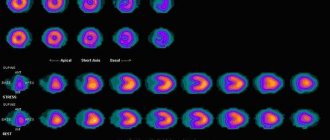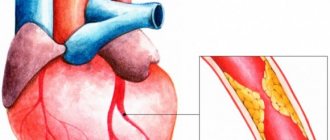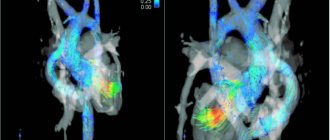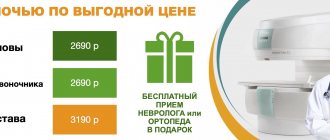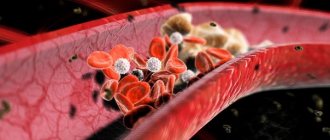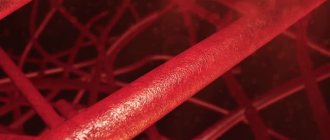The task of the cardiovascular system of the body is the uninterrupted supply of blood, and with it oxygen, nutrients to all human organs and tissues. Our well-being and overall health greatly depend on the coordinated operation of this system. Therefore, it is so important to know how your cardiovascular system functions, whether there are changes, and whether special drug support is needed to slow down the disease process at the initial stage of its development.
The “Healthy Heart” diagnostic program (check-up) is a comprehensive examination that allows you to obtain information about the state of the cardiovascular system, the presence of pathological processes and identify possible risks.
What is included in the diagnostic program “HEART AND VESSELS”
The check-up includes the most important studies for checking the heart and blood vessels:
- Clinical, biochemical and hemostasiological blood tests are needed to check for the presence of inflammation, hormonal imbalances, vascular conductivity and blood clotting. Often, other dangerous diseases are hidden under the symptoms of heart pathologies.
- X-ray of the lungs, ECG, ultrasound of the kidneys and thyroid gland, ECHO of the heart, vascular examination, daily monitoring of pressure and heart rate - these examinations will accurately tell you about the condition of the main organs responsible for the functioning of the cardiovascular system
- A cardiologist, neurologist and ophthalmologist will help you correctly interpret the results, not miss important details in the test results, make the correct diagnosis and prescribe the correct treatment
LABORATORY DIAGNOSTICS FOR HEART DISEASES
There are three groups of indicators:
— Indicators characterizing risk factors for atherosclerosis;
— Nonspecific indicators of stress reaction and necrosis of the heart muscle;
— “Cardiospecific” indicators of cardiomyocyte death.
The first group includes laboratory signs of atherosclerosis:
1) increase in the level of total cholesterol in the blood > 5 mmol/l;
2) increased LDL cholesterol levels > 3 mmol/l;
3) reduction in HDL cholesterol < 1.0 mmol/l;
4) increase in TG level > 1.7 mmol/l.
Second group:
1) leukocytosis 12 – 15*10 9/l, maximum on days 2 – 4 of myocardial infarction, decreases by the end of the week;
2) increase in ESR from 2 – 3 days;
3) by the end of the first week of myocardial infarction, the graphic representation of the leukocyte level and ESR intersect “scissors symptom”. The level of α2 globulins and fibrinogen increases.
Third group: biomarkers of cardiomyocyte death
1) myoglobin - the earliest indicator - increases after 2 hours.
2) troponins I and T - the “gold standard” of diagnosis. If in the first hours of myocardial infarction the level of troponins is normal, then it is necessary to repeat the analysis after 6–12 hours.
3) creatine kinase - MB fraction - specific, but not sensitive. It increases only with large focal myocardial infarctions.
Determination of the level of AST and LDH is not included in the mandatory diagnostic program, since these enzymes are nonspecific (increased in other conditions). Na and K levels indicate whether there are abnormalities in the heart rhythm. Sputum in cardiovascular failure is scanty, pink, with a large number of reticuloendothelial cells (so-called macrophages). The addition of a secondary infection leads to the development of purulent processes and the appearance of clots of yellowish sputum and mucus, which is always very viscous and thick.
Recommended tests for ischemic heart disease: angina pectoris, myocardial infarction, post-infarction cardiosclerosis, arrhythmias and heart block, heart failure.
1) General blood test - changes during the acute period of MI and its complications (pericarditis, endocarditis, thromboembolism, congestive pneumonia). Leukocytosis, accelerated ESR, and anemia develop.
2) General urine analysis - with congestive heart failure, there may be the appearance of protein, leukocytes, and red blood cells. There is a decrease in urine volume (oliguria), and nocturnal diuresis (nocturia) appears.
3) Biochemical blood test - the content of total cholesterol, cholesterol - LDL, TAG often increases.
4) Blood coagulogram - with ischemic heart disease, as a rule, the blood coagulation system worsens. A number of indicators (APTT, INR), D-dimers and others must be monitored during treatment with anticoagulants (heparin, warfarin, fraxiparin).
5) Markers of heart damage - in case of necrosis of the heart muscle caused by myocardial infarction, the most informative indicator is the determination of troponin, myoglobin, creatine phosphokinase, LDH1,2 fraction (HBDN), CRP (nonspecific test).
6) Blood electrolytes – K, Na, Ca, CL. These indicators must be determined in case of arrhythmias and heart blocks, as well as during treatment with diuretics, which can wash them out of the body and in other concomitant conditions (renal failure).
Recommended tests for myocarditis.
1) General blood test - leukocytosis with a shift of the formula to the left may be observed (the appearance of band neutrophils, an increase in the number of segmented neutrophils). Acceleration of ESR.
2) Biochemical blood test - the content of myocardial enzymes increases - CPK (due to the CPK-MB fraction), LDH (due to the LDH fraction, 1), troponin I. An increase in CRP, an increase in α and β globulins may be observed.
4) Tests for antibodies to viruses that can infect the myocardium are prescribed if a specific infection is suspected. These can be viruses, adenoviruses, influenza, measles, mononucleosis infections, CMV, HIV.
5) Tests for bacteria. The causes of myocarditis can be diphtheria bacillus, streptococcus, staphylococcus, gonococcus, clostridia, etc. Therefore, with a corresponding infection, one should not forget about the effect of these microbes on the heart, especially in severe forms of the disease (sore throat, pneumonia).
4) Other tests for pathogens that cause myocarditis - fungi (candidiasis of the heart), rickettsia, spirochetes, toxoplasma, amoeba, schistosomes, toxoplasma. Syphilis most often affects the valve apparatus of the heart.
For hypertension it is recommended to take:
1) General analysis of blood and urine.
2) Biochemical blood test - including cholesterol, LDL cholesterol, HDL, TAG, creatinine, urea, glucose.
3) Blood electrolytes - especially with periodic monitoring during treatment with diuretics.
4) Coagulogram - with hypertension there is a tendency to increase the blood coagulation system.
Laboratory Diagnostics Doctor, Central House of Writers
Novopolotsk city hospital
Afanasenko A.P.
What will a cardiac check-up show?
Every fifth Moscow resident has a confirmed diagnosis of heart and vascular disease. But there are much more hidden pathologies. That is why diseases of the cardiovascular system are the main cause of death in Muscovites. Extending your years of active life is not so difficult - you just need to check your heart in time. After 40 years, the examination should be carried out annually.
Remember that there may be no symptoms for a very long time, and then a stroke, heart attack or coronary heart disease immediately develops.
The examination will also help identify any heart rhythm disturbances, thyroid problems (hyperthyroidism and hypothyroidism), urolithiasis, atherosclerosis and other pathologies.
Who is the program for?
This examination is recommended for all men and women over 18 years of age who care about their heart health. But this program will be especially useful for high-risk groups due to the following factors:
• age over 40 years; • overweight; • diabetes; • high cholesterol in the blood; • presence of bad habits (smoking or alcohol abuse); • presence of close relatives with cardiovascular pathologies diagnosed before the age of 40 years; • with frequent feelings of weakness, shortness of breath, causeless fatigue; • feeling of chest pain; • if you feel a heart rhythm disturbance (interruptions, slowdown or increased rhythm); • with high or low blood pressure.
Blood chemistry
- Total protein (count)
- Creatinine syv(count)
- Urea dry (qol.)
- Uric acid syv(qol)
- Total cholesterol (count)
- Cholesterol-HDL syv (count)
- Cholesterol-LDL syv(count)
- Triglycerides, syv(kol)
- ALT (alanine aminotransferase) serum (count)
- AST (aspartate aminotransferase) serum (count)
- GGT (Gamma-glutamyltransferase) sys.
- LDH (lactate dehydrogenase)
- Glucose syv(qol)
- Na/K/Cl dry (col)
- C-reactive protein serum by ultrasensitive method (col)
- Homocysteine (syv) count
- TSH (thyroid-stimulating hormone) in the blood (count)
- T4 (thyroxine) free in the blood (col)
- T3 (triiodothyronine) free in the blood
For which symptoms is it better to consult a doctor and get diagnosed as soon as possible?
Pathologies of the cardiovascular system are not always expressed by pain in the heart. Periodic deterioration in general health and specific symptoms may indicate them:
- numbness and weakness in the limbs;
- shortness of breath on exertion;
- dizziness and general weakness;
- pale skin;
- feeling of constriction in the chest;
- fluctuations in blood pressure;
- heart rhythm disturbances.
If you notice one or more signs from the list, if there are people with cardiovascular diseases among your immediate family, you need to undergo a comprehensive heart diagnosis as soon as possible.
Instrumental diagnostics
- RG-graphy of the chest organs (2 projections)
- ECG in 12 leads
- Ultrasound of the thyroid gland with Doppler study
- Kidney ultrasound with Doppler study
- Duplex ECHO-KG
- Duplex study of extracranial vessels
- Daily ECG monitoring
- 24-hour blood pressure monitoring
x
The examination program is carried out over 4 visits.
The total cost of the program is 55,450 rubles.
If you have any questions, call us at: +7 495 478-10-03
or order a call and our specialists will contact you at a time convenient for you
Request a call Request a program
References
- Diagnosis and correction of lipid metabolism disorders for the prevention and treatment of atherosclerosis. Eurasian Association of Cardiologists. National Atherosclerosis Society. Moscow, 2021.
- Boytsov S.A. and others. Cardiovascular prevention 2021. Russian national recommendations. Russian Society of Cardiology, National Society of Preventive Cardiology, Russian Society for the Prevention of Non-Infectious Diseases // Russian Journal of Cardiology 2018; 23(6): 7–122.
- Sigurdardottir FD et al. Relative Prognostic Value of Cardiac Troponin I and C-Reactive Protein in the General Population (from the Nord-Trøndelag Health [HUNT] Study) // Am J Cardiol. 2018;121(8): p. 949-955.
- Ford I et al. Ticagrelor for Prevention of Ischemic Events After Myocardial Infarction in Patients With Peripheral Artery Disease // J Am Coll Cardiol. 2016; 68(25), p. 2719-2728
- Naess IA, Christiansen SC, Romundstad PR et al. Prospective study of homocysteine and MTHFR 677TT genotype and risk for venous thrombosis in a general population—results from the HUNT 2 study. // Br. J. Haematol., 2008, v. 141, p. 529–535.
- Moat SJ Plasma total homocysteine: instigator or indicator of cardiovascular disease? //Ann. Clin. Biochem., 2008, v. 45, p. 345–348.
Get a cardiac examination in Moscow
The importance of timely diagnosis of cardiovascular diseases cannot be overestimated. Patients can ignore many dangerous symptoms, attributing them to fatigue, suspecting problems with other organs. Clinic No. 1 in Moscow offers to attend a consultation with a cardiologist, undergo tests and examinations, and undergo treatment, if necessary. The diagnostic center has all the necessary equipment for a comprehensive examination and treatment of patients of all ages. You can find out from the clinic’s specialists what procedures are included in the full list of cardiac examinations and find out the conditions for their implementation. You can make an appointment by phone or through the clinic’s website.
Benefits of a comprehensive examination
The comprehensive heart diagnostics service is a quick way to find out about all the problems in the functioning of the heart and blood vessels. Its advantages:
- identifying all possible problems with the heart and blood vessels in a short period of time;
- the ability to identify hidden pathologies based on the analysis of concomitant abnormalities;
- affordability - the cost of a set of studies is up to 30-50% lower than when undergoing tests and procedures separately.
The cardiological examination program includes consultations with a therapist and cardiologist, a detailed study of laboratory tests of blood and serum, digital X-rays, ECG and ultrasound of blood vessels, and other studies.


